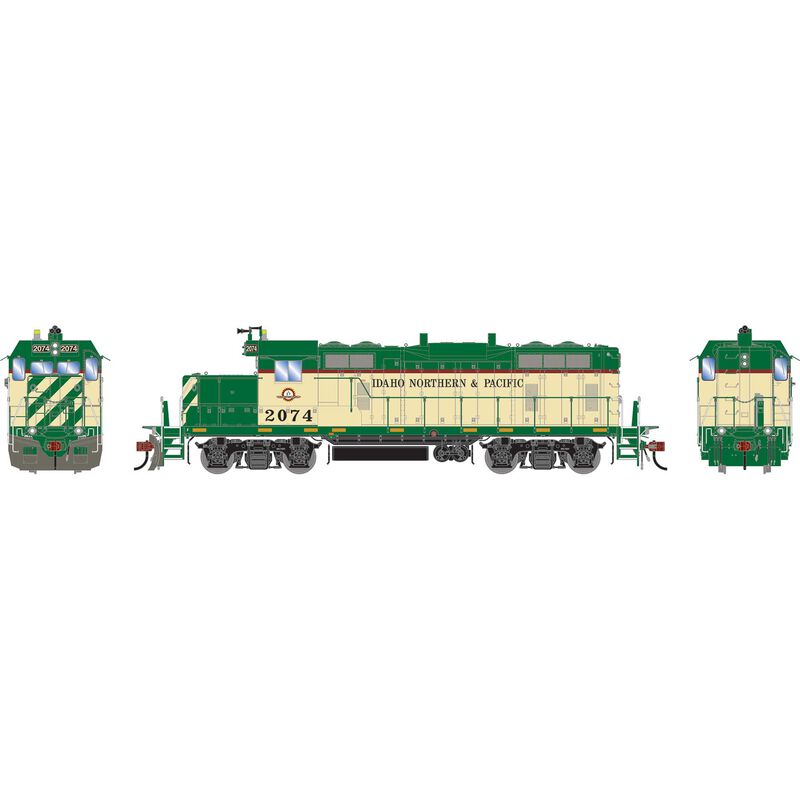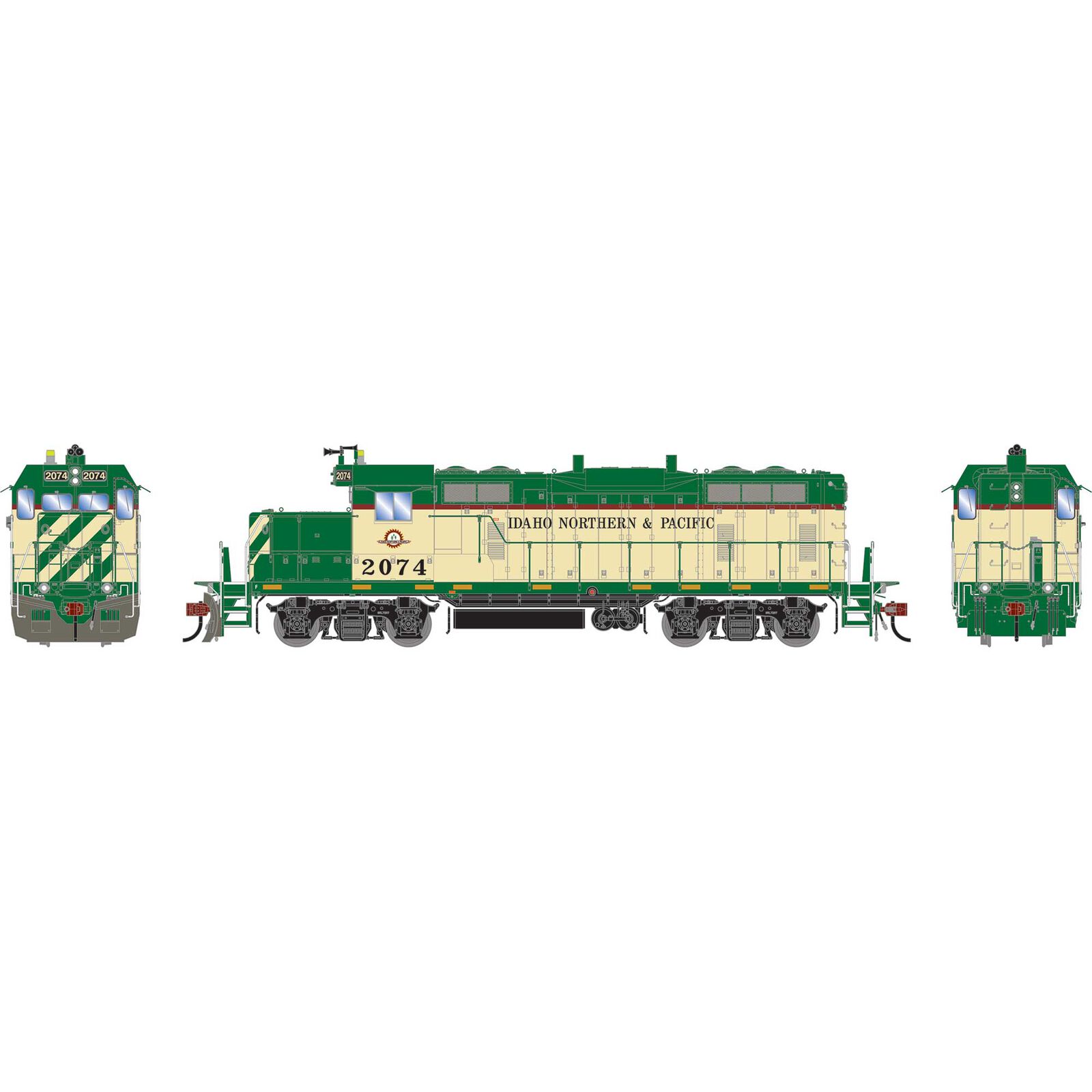HO GP7u Locomotive, INPR #2074
New Roof access hatches on non-dynamic units per prototype
Undecorated and former Santa Fe patched versions perfect for freelance modelers
Idaho Northern & Pacific compliment the recent CA-11 release
GP7 SERIES LOCOMOTIVE FEATURES:
- Coupler cut levers
- Drop steps unless noted
- “Nub” style walkway tread
- Lift rings
- Windshield wipers
- Roof access hatches on non-dynamic units per prototype
- Detailed fuel tank with fuel fillers, fuel gauges, breather pipes, and retention tanks
- Blomberg-B trucks with appropriate bearing caps
- See-through cab windows and full cab interior
- Etched metal radiator intake grilles and fan grilles
- Body-mounted McHenry® scale knuckle couplers - Kadee® compatible
- Scaled from prototype resources including drawings, field measurements, photographs, and more
- Genesis driveline with 5-pole skew wound motor, precision machined flywheels, and multi-link drivetrain
- All-wheel electrical pickup provides reliable current flow
- LED Lighting for realistic appearance
- Trainline and MU hoses
- MU stands
- Windshield wiper
- Wire grab irons
- Sander lines
- Bell placement & type per prototype
- Speed recorder unless noted or shown elsewhere
- Fine-scale Celcon handrails for scale appearance
- Air tanks mounted below sill unless noted
- DCC-ready features Quick Plug™ plug-and-play technology with 21-pin NEM connector
- Accurately painted and printed paint schemes
- All-wheel drive with precision gears for smooth & quiet operation
- Wheels with RP25 contours operate on all popular brands of track
- Heavy die-cast frame for greater traction and more pulling power
- Packaging securely holds for the model for safe storage
- Minimum radius: 18”
SOUND-EQUIPPED MODELS ALSO FEATURE:
- Onboard DCC decoder with SoundTraxx Tsunami2 sound
- Sound units operate in both DC and DCC
- Engine, horn, and bell sounds work in DC
- Precision slow speed control
- Program a multiple unit (MU) lashup with lead unit only horn, bell, and lights
- Dual cube speakers for optimal sound quality
- Full DCC functions available when operated in DCC mode
- All functions NMRA compatible in DCC mode
- Many functions can be altered via Configuration Value (CV) changes
- CV chart included in the box
ROAD NUMBER SPECIFIC FEATURES:
- #701 Ex-ATSF GP7 #2652 / GP7u #2179. Cab-mounted headlight, large firecracker antenna and ground plane, roof-mounted air tanks.
- #903 Ex-ATSF GP7 #2772 / GP7u #2084. Nose-mounted headlight, large Sinclair antenna and ground plane, spark arrestors, Western Cullen beacon (effect in DCC only).
- #2074 INPR #2074 is ex-ATSF GP7 #2876 / GP7u #2074. Blanked-dynamic, Nathan P3 horn on bracket, spark arrestors, xenon strobe (effect in DCC only), tall snowplow
- #2094 INPR #2094 is ex-ATSF GP7 #2773 / GP7u #2094. Non-dynamic, Nathan K5LA horn on bracket, blanked out left front number board per prototype photos
Ex-ATSF Patched FEATURES:
- Non-dynamic
- Nose-mounted headlight
- 4 exhaust stacks included
- Nathan K3LA horn on bracket
- Cab Air conditioner
- Large Sinclair antenna and ground plane
Undecorated FEATURES:
- Non-dynamic
- Nose-mounted headlight
- 4 exhaust stacks included
- Nathan K3LA horn on bracket
- Cab Air conditioner
- Large Sinclair antenna and ground plane
- Detail parts not listed are not included
CKRY FEATURES:
- Non-dynamic
- 4 exhaust stacks
- Leslie S-3L-R horn with bracket
INPR FEATURES:
- Cab-mounted headlight
- 2 exhaust stacks
- Large firecracker antenna
FCEN FEATURES:
- Blanked-dynamic
- Cab-mounted headlight
- 4 exhaust stacks
- Nathan P5 horn on bracket
- Large Sinclair antenna and ground plane
SFS FEATURES:
- Non-dynamic
- Cab-mounted headlight
- 4 exhaust stacks
- Small firecracker antenna
- Leslie RS-5T-RRO horn with mounting bracket
PROTOTYPE AND BACKGROUND INFO:
In 1949, EMD introduced the GP7. The basic design followed most diesel switchers with the addition of a short hood instead of an end-cab. The hoods were also full height to better accommodate the diesel engine and mechanical and electrical components.
Many railroads chose to rebuild their GP7s and GP9s for continued service. Often times, it was cheaper to do this rather than purchasing brand-new locomotives. Some railroads adopted a GP7R or GP7u designation to indicate a rebuilt unit.
Santa Fe began a program in its Cleburne, TX shops to rebuild GP7s. The program was started in 1972. The high short hoods were chopped down, dynamic brakes deactivated (if present) and in some cases new cabs were installed. The prime movers were upgraded with new components. The upgraded geeps gave long service and many lasted through the BNSF merger.

